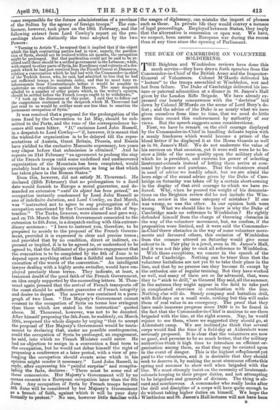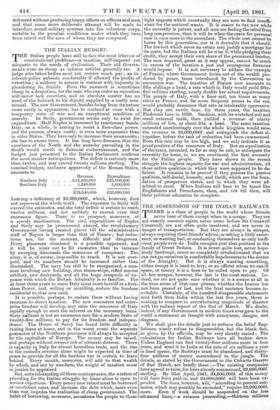THE DUKE OF CAMBRIDGE ON VOLUNTEER SOLDIERING.
THE Brighton and Wimbledon reviews have done this much service—they have drawn forth speeches from the Commander-in-Chief of the British Army ,and the Inspector- General of Volunteers. Colonel McMurdo delivered his " lecture" to the troops assembled at Wimbledon, wet and hot from failure. The Duke of Cambridge delivered his lec- ture or paternal admonition at a dinner in St. James's Hall given by the London Rifle Brigade. We have already ex- pressed our hearty concurrence with the " doctrine" laid down by Colonel McMurdo on the scene of Lord Bury's de- feat ; and the advice of the Duke is so nearly- what we have given ourselves from time to time, that we need do little more than record this endorsement by authority of our views. But the speech suggests some considerations.
First, we have to remark on the civil courage displayed by the Commander-in-Chief in handling delicate topics with a manly frankness which would become a prince of the blood better if he displayed it at the Horse Guards as well as in St. James's Hall. We do not underrate the value of his services on that occasion, yet it were well were he to be- stow a little of the same quality upon the military club of which he is president, and exercise his power of selecting lieutenant-colonels instead of letting them arrive at com- mand by chance and purchase. That the volunteers stand in need of advice we readily admit, but we are afraid the keen edge of the sound advice given by the Duke of Cam- bridge on Saturday was taken off by a certain short-coming in the display of that civil courage to which we have re- ferred. Why, when he poured the weight of his denuncia- tions on the Brighton review did he not include the Wim- bledon review in the same category of mistakes ? If one was wrong, so was the other. In our opinion both were wrong. What we should like to know is why the Duke of Cambridge made no reference to Wimbledon ? He rightly defended himself from the charge of throwing obstacles in the way of the volunteer movement, but, we confess, if the proposition were limited, and it were said the Commander- in-Chief threw obstacles in the way of some volunteer move- ments and favoured others, this omission of Wimbledon from the censure uttered on Saturday would give some colour to it. Fair play is a jewel, even in St. James's Mal, and it was not fair play to omit all reference to Wimbledon.
With these exceptions, we concur in the speech of the Duke of Cambridge. Nothing can be truer than that the volunteer battalions are not yet fit to take their place in the line, and that by no process can they become fit except by the orthodox one of regular training. But they have worked so well, and many of them are so far advanced, that, were they to " stick to drill," as General Hay said, all the summer, in the autumn they might appear in the field to take part in complicated exercises in combination with the line. Nothing else will do. Steady company and battalion drill, with field-days on a small scale, nothing but this will make them of real value in an emergency. The proof that they have made immense progress since 1860 is to be found in the fact that the Commander-in-Chief is anxious to see them brigaded with the line, at the right season. Nay, he would rejoice to see thou, where we suggested they should go, at Aldershott camp. We are inclined Lto think that several corps would find the time if a field-day at Aldershott were seriously proposed. It is clear that the volunteers are now so good, and promise to be so much better, that the military authorities think it high time to introduce an efficient or- ganization among them, so that they may be counted upon in the event of danger. This is the highest colnpliment yet paid to the volunteers, and it is desirable that they should seek to deserve it, by making the most strenuous efforts this spring and summer to show well when brigaded with the line. We must strongly insist on the necessity of lieutenant- colonels keeping to their proper duties, and not attempting to be brigadiers and generals of division. The thing is ab- surd and mischievous. A commander who really looks after the drill and discipline of a corps will have quite enough to do without taking higher duties on himself. We hope the Wimbledon and St. James's Hall lectures will not have been delivered without producing happy effects on officers and men, and that some more deliberate attempt will be made to introduce sound military systems into the volunteer corps, suitable to the peculiar conditions under which they have been raised and the men of whom they are composed.































 Previous page
Previous page